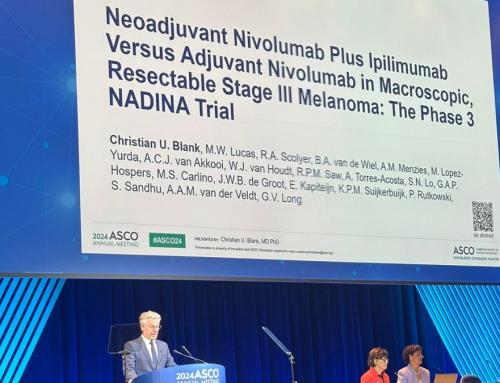A contemporary overview of Cutaneous melanoma, co-authored by MIA, has been published in The Lancet, one of the world’s leading medical journals.
Melanoma Institute Australia’s Prof Georgina Long AO, Prof Richard Scolyer AO and Assoc Prof Alex Menzies, along with US colleagues Prof Jeff Gershenwald and Prof Susan Swetter, recently completed this comprehensive and up-to-date review of cutaneous (skin) melanoma – including the latest facts, advances in diagnosis, and breakthroughs in management of the disease.
“I’m delighted to have completed this comprehensive review of the state of play on cutaneous melanoma with my melanoma colleagues Prof Richard Scolyer, A/Prof Alex Menzies, Prof Jeff Gershenwald and Prof Susan Swetter.” – Professor Georgina Long AO
“There have been monumental advances in the diagnosis and management of cutaneous melanoma over the past decade, and I am proud to be part of the team which has authored this contemporary summary now published in The Lancet, one of the world’s highest impact medical journals.” – Professor Richard Scolyer AO
Article abstract
Cutaneous melanoma is a malignancy arising from melanocytes of the skin. Incidence rates are rising, particularly in White populations. Cutaneous melanoma is typically driven by exposure to ultraviolet radiation from natural sunlight and indoor tanning, although there are several subtypes that are not related to ultraviolet radiation exposure. Primary melanomas are often darkly pigmented, but can be amelanotic, with diagnosis based on a combination of clinical and histopathological findings. Primary melanoma is treated with wide excision, with margins determined by tumour thickness. Further treatment depends on the disease stage (following histopathological examination and, where appropriate, sentinel lymph node biopsy) and can include surgery, checkpoint immunotherapy, targeted therapy, or radiotherapy. Systemic drug therapies are recommended as an adjunct to surgery in patients with resectable locoregional metastases and are the mainstay of treatment in advanced melanoma. Management of advanced melanoma is complex, particularly in those with cerebral metastasis. Multidisciplinary care is essential. Systemic drug therapies, particularly immune checkpoint inhibitors, have substantially increased melanoma survival following a series of landmark approvals from 2011 onward.






Leave A Comment